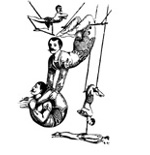
Mirth, Madness & The News You May Have Missed
EDITORIAL
While some of the articles we’ve been publishing lately are lengthier than those in earlier issues, you might have noticed that The News You May Have Missed column has increased in length too. The entries themselves, however, are as brief as always — there are simply more of them. So, on the one hand, while we are publishing some longer articles, we are also increasing the number of these short features. Weird, huh?
Why are we doing this? For one basic reason: We’ve received feedback from a great many readers who love the column. So, we thought, why not give you more of what you want? There’s no more to it than that.
We have, however, received a few complaints about the News column over the years, even queries about why it appears in our pages at all. Some of you have told us that this type of material has no place in a “serious” magazine. Yes, the NOR is, for the most part, a serious magazine. But we feel that a little levity helps lighten the intellectual load. Mirth is good for the spirit. And as G.K. Chesterton wrote, “You can be a great deal too solemn about Christianity to be a good Christian…. You must have mirth. If you do not have mirth you will surely have madness.”
But The News You May Have Missed isn’t just an exercise in frivolity. Its ultimate purpose is to provide a series of snapshots that capture the folly of a fallen world that’s forgotten God, and the absurdity of modern man alienated from his true self. The column fingers the fault lines of a culture that’s undergoing a series of dramatic, self-made tectonic shifts. At least that’s what it’s supposed to do. The column is meant to be amusing, true; but the cumulative effect ought to be largely depressing to thinking people.
You May Also Enjoy
The Poor Misunderstood Pope?
The story of this repentant and reformed killer is an astounding tale of redemption and sacrifice that has inspired authors, playwrights, and filmmakers.
Ratzinger found Jesus not only in Tradition and Scripture but also in the Church as the Mystical Body of Christ and most directly in the Real Presence.

